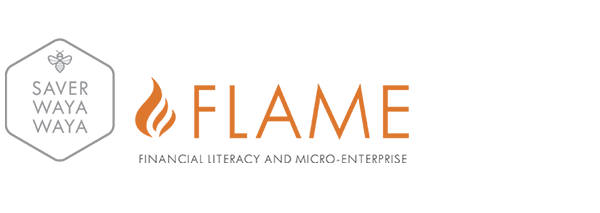

FLAME is a multi-phase, 18-month, deep intervention programme which enhances financial literacy and business capability through the transfer of knowledge and skills. FLAME uses a combination of in-person workshops, business coaching and personal mentoring interventions. The programme facilitates greater economic participation and job creation by supporting income generation activities. As a FLAME participant you also have access to business development support interventions and facilitated access to markets.
FLAME will help you gain critical financial literacy knowledge and skills, coupled with basic entrepreneurship and business development skills with the aim to help you become more financial capable to encourage greater economic participation.
You will go through three phases, which will include several face-to-face workshops which are presented by people who understand your community, speak your language and have years of experience in training and coaching entrepreneurs.
Phase 1: The programme will introduce you to important financial topics that will help you personally and in your business. You will attend weekly workshops, form groups with other entrepreneurs and get an opportunity to test your pitching and presentation skills.
Phase 2: In the second phase there are monthly workshops, and a business coach will visit your business regularly to check on your progress and provide support on how to apply what you learn at the workshops in your business. You will also learn more about your specific business. You will understand better how to have a proper business plan, keep records, market your business, and sell your goods or services, while still receiving coaching.
Phase 3: In Phase 3, you will be prepared to exit the programme with tools and templates to use in growing your business and attend the closeout event where special programme awards and other prizes are awarded.
For more info on our programme, download the brochure
“I didn’t know enough about business before. Now I can change my business because I’ve learned so much – financial planning, marketing and how to grow my business. I understand how social media can help me with marketing in a cheap way. I don’t travel so often anymore to tell people about my business. I know which people to target and I’m much more motivated to contact potential customers.” -
Lesego Moruka. Rustenburg (FLAME 1, 2016 -2018)
“As someone who has been part of lot of enterprise development programmes, I was bit doubting in the beginning not sure if I wanted just another certificate, but this turned up not to just to be another certificate; it was a journey that was worth it for my business. There is a lot of mechanisms that are put in place to ensure that whatever you learn in class you must implement it in your business “
Siyabulela Nothwala, Hermanus (FLAME 3, 2022-2023)
The lessons I’ve applied are how to do proper pricing and how to budget; it’s also helped me with my saving skills. It’s helped me increase my profits, as I implement a lot of what I learnt on the programme. With what I now know, I can take my business to the next level.
Lutho Booi, King William’s Town (FLAME 2, 2019–2021)